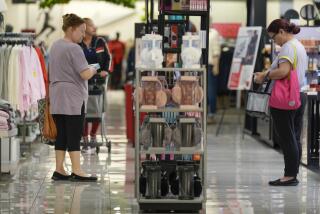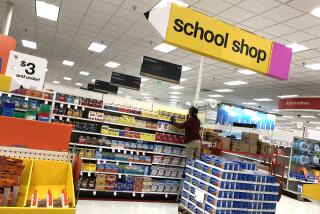Adding Devices to the Equation
Parents say they’re reining in their back-to-school spending this year, but that isn’t deterring long-suffering retailers from pushing high-tech gadgets as this year’s “must-have” back-to-school items.
Struggling to sell clothing and pencils to students and electronics to adults, many retailers are hoping to solve both problems by redoubling efforts to pitch personal digital assistants, cell phones and computers as educational tools for teens.
Even as color-screen digital organizers and glittery metallic cell phones grow in popularity and come down in price, however, consumer electronics still could prove to be a tough sell this fall.
Parents on average say they plan to spend less this year on back-to-school items than they did last year, according to two new national surveys, the first time in a decade that parents have failed to up the annual fall ante. Consumer confidence this month slipped to its lowest level since November 2001.
What’s more, many students already have a full array of electronic goods, analysts say, making it easier for parents to decline to upgrade to the latest models.
“He and all his friends already have cell phones--now he says he needs a better one, with a two-way pager and games,” said Rhonda Spearman, 44, as she and her 13-year-old son examined giant bins of pens and pencils at a Target store in Southwest Los Angeles. “They don’t need it, and it’s not economical.”
But that isn’t deterring retailers from making a big push for back-to-school gadgets.
“We’re seeing more circulars, more ads and more promotions,” said Tom Edwards, an analyst with the Techworld division of market research firm NPD Group. “I think it’s grasping for some reason to promote, some event to help stimulate the sales.”
Those sales were tough to come by this summer, particularly in consumer electronics. Technology sellers got hit hard in July, a result of stock market jolts and tough comparisons to last year, when tax rebate checks funded a spurt in spending, analysts said.
“We’ve seen nothing from the retailers suggesting that any July malaise went away in August,” said Matt Fassler, an analyst with Goldman Sachs & Co. in New York. “Parents, being consumers like the rest of us, are pulling back on discretionary spending.”
Although overall spending was better than expected in July, most of that growth came from purchases of durable goods with discounted financing, such as cars and appliances.
For many retailers, however, hope springs electronic.
A recent Circuit City newspaper insert, headlined “Get in gear for school, for work, for fun,” featured hand-held electronic organizers, computers, MP3 music players and even a video game console--”all the on-campus essentials.”
Circuit City spokesman Bill Cimino said the company chose which products to highlight after interviewing returning college students about their needs.
“Back-to-school is one time where we show families how these products can work in their lives today and revolve around school,” he said.
Internet users, meanwhile, have been bombarded with e-mails, pop-up ads and online shopping guides promising to “keep students plugged in” with cell phones, computers and stereo systems.
For many retailers, the response so far has been less than overwhelming.
Best Buy Co., the country’s largest seller of consumer electronics; Massachusetts-based Tweeter Home Entertainment Group Inc.; and Denver-based Ultimate Electronics Inc. each has said recently that weak sales would mean lower-than-expected quarterly earnings. RadioShack Corp. specifically cited a significant slowdown in August sales as the reason for reducing its quarterly earnings guidance.
On a Sunday afternoon just days before the beginning of school, Jennifer Knobel, 17, was the lone shopper browsing among laptop computers at a Southland Circuit City--and only because USC requires the machine for Jennifer’s architecture classes, her mother said.
“We are just doing whatever is necessary,” said Magaly Knobel, who traveled from Moraga, Calif., with her husband to help their daughter get settled. “I don’t think you need everything.”
Mothers shopping at Target last week concurred. Lorie Benjamin, during a brief break in her hunt for notebooks and pens, said 11-year-old Shannon asked for a cell phone “for school” at Holy Name of Jesus in Los Angeles. Benjamin, however, wasn’t buying.
“She’s getting straight school supplies, the stuff on the list--and not even all of that,” Benjamin, a 44-year-old employee with the city of Los Angeles, said of her daughter. “What does any of that high-tech stuff have to do with school? How is it going to put my child on the honor roll?”
In its poll of parents of teenagers, Capital One Financial found that parents nationwide planned to spend an average of $97 on school supplies, down from $118 last year.
Another survey, by market research firm America’s Research Group, recorded the lowest back-to-school spending total in 10 years, with parents planning to spend an average of $302.11 for all their back-to-school products, down from $336.48 last year. Of those surveyed, 86% said they would buy fewer items this year, and 14% said they planned to buy cheaper products.
Even so, it may be too soon to tell if electronics sales are a bust this season, said Edwards of NPD Techworld. What parents say they plan to buy and what they dobuy are often vastly different, he said.
“Last year we worried that Christmas would be a washout after Sept. 11,” he said, “and it turned out to be one of the strongest Christmases ever for consumer electronics.”
More to Read
Inside the business of entertainment
The Wide Shot brings you news, analysis and insights on everything from streaming wars to production — and what it all means for the future.
You may occasionally receive promotional content from the Los Angeles Times.










